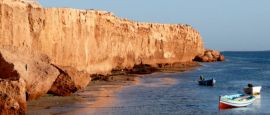Tunisia History, Language and Culture
History of Tunisia
Like much of North Africa, Tunisia's history is one littered with conquests that completely changed the country's path. The most famous people of the ancient world to mark the area of modern-day Tunisia were the Phoenicians, who settled here in the 1st millennium BCE and went on to found their legendary capital of Carthage.
The Phoenicians' expanding regional power brought them to the attention of the Ancient Greeks, and later Rome, leading to the Punic Wars. After three wars, Rome emerged victorious and it is largely their mighty monuments that have survived in Tunisia today.
As Rome waned, the region fell first into the hands of the Byzantine Empire, but it was the Arab Conquest of the 7th century CE that changed the land forever, introducing Islam and a sophisticated culture. Further invasions in the 11th to 13th centuries by Arab tribesman, then Almoravids and Almohads transformed the region even further, bringing near-total Arabisation, new cities and sparkling mosques.
By the 16th century, the Ottoman Turks had incorporated Tunisia into their vast empire, though left little mark on the masses. They held sway until the 19th century 'Scramble for Africa' by European empire builders. The Italians were initially most prominent, until French troops invaded from the neighbouring colony in Algeria, and made Tunisia a French protectorate in 1881.
Independence from France was achieved in 1956, and Habib Bourguiba became the country’s first president. His government was responsible for many of the facets that still shape Tunisia today, from widespread public education to female emancipation.
Bourguiba was succeeded by President Zine El Abidine Ben Ali in 1987, who billed himself as a great moderniser, and announced major economic reforms. Despite this, his regime was guilty of numerous human rights offences and widening inequality, while cronyism and corruption became norms in the latter years of his dictatorship. At the same time, nearly all forms of opposition to Ben Ali's government were repressed through a powerful security apparatus.
In December 2010 rising disenchantment with the regime led to widespread public demonstrations over unemployment, poverty, and freedom of speech, which became known as the Jasmine Revolution and was the trigger for the Arab Spring that swept across the region. Ben Ali was forced to step down as president in January 2011, ushering in a new democratic era.
Did you know?
• The Berbers are believed to have arrived in modern-day Tunisia around 2000 BCE; there remains a small but significant Berber minority.
• During the French protectorate, Tunisians could become French citizens – only if they renounced their 'Muslim' status.
• Until independence, there were almost 100,000 Italians living in Tunisia.
Language in Tunisia
The official language is Arabic. French is the second language, English, German and Italian are spoken mainly in tourist resorts.
Hello/hi = salaam
Good morning = sbaah al-kheer
Good evening = masaa al-kheer
Goodbye = bi-salaama
Yes = naam
No = La
Please = min fadlak
Thank you = ayshik
You're welcome = blaa imzeeya
What is your name? = waash ismek?
My name is = asmee
How are you? = kee raak?
I'm fine = la bas ilhamdulilah
Where are you from? = minaan inta?
I'm from = ana min




 You know where
You know where